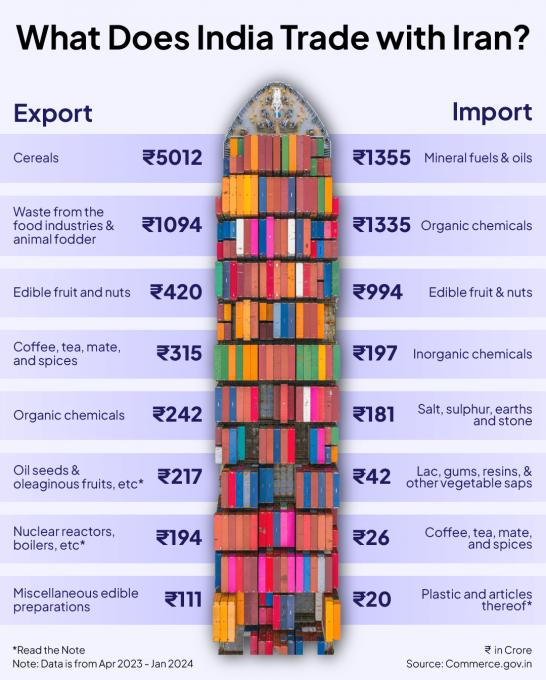Recently, tensions have escalated between Iran and Israel. Hostility has persisted between the two countries for many years, and recent events have only exacerbated this tension. There is concern worldwide that the recent attacks by Iran on Israel could escalate into a full-blown conflict in the Middle East, causing alarm across the globe.
But how might this conflict affect the Indian Stock Market or economy? Let’s understand.
What’s Happening?
You may have recently heard about the escalating tensions between Iran and Israel, which could lead to volatility in the Indian stock market in the coming week.
On April 13, in response to an April 1 attack on its embassy in Damascus, Iran launched a drone and missile strike on Israel, turning the ongoing tension between the two countries into direct conflict. In retaliation, Israel and its allies launched a strong counterattack.
Now let’s delve into the reasons behind this attack and its implications for investors.
Origin of Iran-Israel Conflict
According to the BBC, Iran and Israel were allies before the Islamic Revolution of 1979. However, after that, a new regime emerged that was hostile to Israel and did not recognise its existence.
On the other hand, Israel perceives Iran as a threat to its existence, as Iran has increased funding to proxy forces such as Hezbollah and Hamas. Moreover, Iran has been accused of developing nuclear weapons, although Iran denies these allegations.
How Can the Iran-Israel Conflict Affect India?
According to Money Control, India imports over 80% of its oil requirements, making it highly sensitive to fluctuations in global Crude Oil Prices due to any event. If the Iran-Israel conflict continues and disrupts oil supplies from the Middle East, we could see an increase in crude oil prices.
Furthermore, geopolitical tensions have already caused a 6% rise in Brent crude oil prices in just the past two weeks, now trading above $90 per barrel. Not only that, due to tensions in the global market and an extension of OPEC’s production cuts until June 2024, Brent crude prices have increased by 17% year-to-date.
Trade between India and Iran
India exports various commodities to Iran, including grains, food industries, animal feed, fruits, tea, coffee, spices, etc. Similarly, India also imports several items from Iran, including mineral fuels and oils, organic chemicals, fruits, and nuts.
The image below simplifies the extensive trade between India and Iran:
Note – *Oil Seeds and Olea. Fruits, miscellaneous Grains, Seeds and Fruit; Industrial or Medicinal Plants, Straw and Fodder.
*nuclear reactors, boilers, machinery and mechanical appliances, parts thereof.
Impact of Iran-Israel Conflict on the Indian Stock Market
Due to the unrest in the global market caused by the Iran-Israel conflict, the Indian benchmark indices, Sensex and Nifty, witnessed a decline of nearly 1% on Monday.
According to Money Control, analysts believe that if the Iran-Israel conflict escalates into war, Brent crude oil prices could rise above $100 per barrel, already showing its impact on the Indian stock market.
Oil Market Companies: Increase in crude oil prices could raise costs for these companies, putting pressure on their margins. For example, stocks of HPCL, IOC, Adani Total Gas, and BPCL saw a decline of up to 3% on Monday.
Tyre Companies: Tyre industry utilises derivatives of crude oil to manufacture synthetic rubber. Therefore, an increase in crude oil prices could also raise costs for these companies. Stocks of MRF, Apollo Tyres, and CEAT saw a decline of up to 2%.
Paint Companies: Paint manufacturers also use derivatives of crude oil in their production. Hence, an increase in crude oil prices could raise input costs for these companies.
What’s in it for Investors?
The relationship between Iran and Israel has always been tense, and it seems that the current situation could escalate into ongoing conflict. Therefore, volatility in the market is expected in the near future. Investors can benefit by selecting quality companies with rapid growth potential during market declines to achieve better returns.
What’s Next?
According to ET, as global leaders urge both parties to show restraint, President Biden cautioned Israeli Prime Minister Benjamin Netanyahu that the United States will not join any retaliatory actions against Iran should Israel decide to respond. While reaffirming U.S. support for Israel’s defense, John Kirby, the top national security spokesperson for the White House, emphasised on ABC’s ‘This Week’ program that the U.S. seeks to avoid war.
That’s it for today. We hope you’ve found this article informative. Remember to spread the word among your friends. Until we meet again, stay curious!
*The companies mentioned in the article are for information purposes only. This is not investment advice.
*Disclaimer: Teji Mandi Disclaimer
This post first appeared on 50/30/20 Budget Rule You Need To Know!, please read the originial post: here

